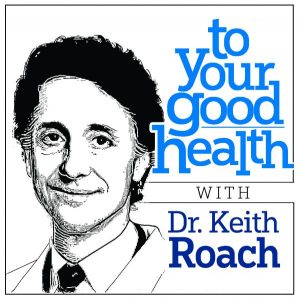TO YOUR GOOD HEALTH : False positives plague lung cancer screening
June 27, 2022 DEAR DR. ROACH: I’m a 74-year-old female who smoked a pack a day for 40-plus years, having quit smoking about 18 years ago. As a precaution, I asked my primary doctor to order a screening CT scan, knowing that I’m a candidate for lung cancer. The results showed a 3 mm nodule in one lung, and I was advised not to worry and that my doctor would order another CT scan in six months. I can’t help but wonder if this is cancer and if an oncologist, after six months, will ask me why I waited so long to see him. — T.W.
DEAR DR. ROACH: I’m a 74-year-old female who smoked a pack a day for 40-plus years, having quit smoking about 18 years ago. As a precaution, I asked my primary doctor to order a screening CT scan, knowing that I’m a candidate for lung cancer. The results showed a 3 mm nodule in one lung, and I was advised not to worry and that my doctor would order another CT scan in six months. I can’t help but wonder if this is cancer and if an oncologist, after six months, will ask me why I waited so long to see him. — T.W.
ANSWER: Medical professionals have been attempting to screen for lung cancer for decades. Chest X-rays proved insensitive: By the time cancer could be seen on X-ray, it was usually too late to do anything about it. CT scans are much more sensitive (maybe too sensitive; see below), and studies have shown that some lives will be saved with a screening program. However, the number of people who would benefit is relatively small; 256 moderate-to-heavy smokers would need yearly screening for three years in order to prevent one lung cancer death.
There are two other significant concerns about lung cancer screening. The first is the issue you have now: an abnormal result and what to do about it. It’s extremely common. Almost 25 percent of scans will be abnormal, and 96 percent of the abnormal results will be false positives. But it will require multiple scans and sometimes an invasive procedure to prove it. This means a great deal of anxiety among people who get the type of result you did.
The small size of your nodule means your risk that this nodule is cancer is much lower than 1 percent. A follow-up scan is the usual recommendation, and if the nodule is the same size or smaller, the chance of it being cancer is very close to zero. You should have had a careful explanation of the likelihood of false positive results before getting the scan. You should also have been warned of the possible need for a biopsy and the possible financial costs associated with follow-up testing.
The second concern is current smokers who consider screening. A negative CT scan is not a “clean bill of health” for a smoker, and quitting remains the single most important thing most smokers can do for their overall health.
***
DEAR DR. ROACH: Are deodorants containing aluminum safe to use? The brands that do not contain aluminum are much less effective. I am concerned about absorbing the aluminum from the deodorant and its effect on the brain. — D.M.
ANSWER: That’s a myth.
The amount of aluminum in antiperspirants is negligible. Deodorants that aren’t also antiperspirants don’t contain aluminum. The aluminum mechanically blocks the sweat glands in the armpit, and 99.99 percent of it is not absorbed into the body. Long-term studies of people taking aluminum-based antacid (which is also poorly absorbed) have shown no increased risk of dementia. The body has several ways of removing the small amounts of aluminum we absorb, mostly via the kidneys. Aluminum toxicity IS a potential problem for people with kidney disease on dialysis, but the small amounts of aluminum in antiperspirants is too small to worry about even in those cases.
There is absolutely no reason to be concerned about the health effects of aluminum on the brain.
Dr. Roach regrets that he is unable to answer individual questions, but will incorporate them in the column whenever possible. Readers may email questions to ToYourGoodHealth@med.cornell.edu.
© 2022 North America Synd., Inc.
All Rights Reserved
TO YOUR GOOD HEALTH Chest CT can’t replace screening mammogram







